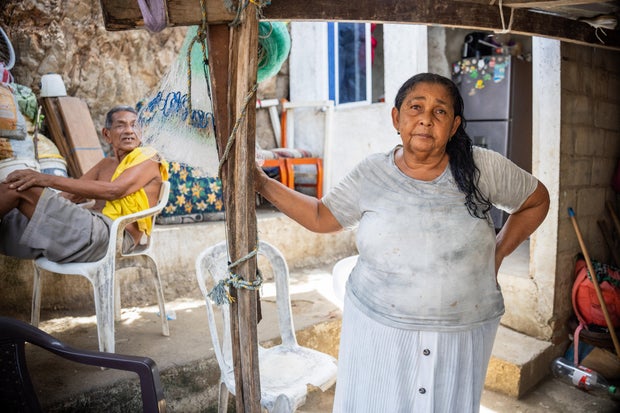Alejandro Carranza’s loved ones say he left home on Colombia’s Caribbean coast to fish in open waters. Days later, he was dead — one of at least 32 alleged drug traffickers killed in U.S. military strikes.
From Santa Marta, northern Colombia, Carranza’s family is questioning White House claims that he was carrying narcotics aboard a small vessel targeted last month.
For his wife Katerine Hernandez, the 40-year-old was “a good man” devoted to fishing.
“Why did they just take his life like that?” she asked during an interview Monday with AFP.
She denied he had any link to drug trafficking.
“The fishermen have the right to live. Why didn’t they just detain them?”
The Trump administration has said the U.S. is in a “non-international armed conflict” with drug cartels, arguing that the narcotics they smuggle kill tens of thousands of Americans every year, constituting an “armed attack.”
Since the United States began bombing boats in the Caribbean in September, critics have accused the Trump administration of carrying out extrajudicial executions.
The White House and Pentagon have produced little evidence to back up their claims that those targeted were involved in trafficking.
Colombia’s President Gustavo Petro, a critic of the U.S. military presence in the Caribbean, has also claimed Carranza was innocent.
Petro said his crew suffered a mechanical failure at sea.
“The Colombian boat was adrift with a distress signal, its engine raised,” Petro wrote Saturday on X. “He had no ties to drug trafficking. His daily activity was fishing.”
However, Colombian media have reported that Carranza had a criminal record for stealing weapons in collusion with gangs.
Prosecutors contacted by AFP refused to confirm or deny the reports.
The U.S. government has released statements and images purporting to show strikes on at least seven boats allegedly carrying drugs, leaving at least 32 dead.
“The days went by and he didn’t call”
Before his last trip, Carranza told his father he was heading to a spot “with good fish.”
Days passed without contact, until the family learned of the bombing on television.
“The days went by and he didn’t call,” Hernandez said.
MARCO PERDOMO/AFP via Getty Images
The deadly strikes have sparked a diplomatic row between the United States and Colombia, historically close partners.
Petro condemned the attack as a violation of Colombian sovereignty and labeled it an “assassination.” In a post on X, Petro said the U.S. operation was part of a “failed strategy” to “control Latin America … and obtain cheap oil from Venezuela.”
Mr. Trump later called Petro an “illegal drug leader” and threatened to cut off U.S. aid to the South American country.
Last month, Washington announced it had decertified Colombia as an ally in the fight against drugs. Colombia hit back by halting arms purchases from the United States, its biggest military partner.
Friends interviewed by AFP also insisted Carranza was a fisherman.
“He went offshore to catch sierra, tuna, and snapper, which are found far out at this time of year,” said Cesar Henriquez, who has known him since childhood.
“He always came back to Santa Marta, secured his boat, and went home. I never knew him to do anything bad,” Henriquez told AFP.
A Colombian and an Ecuadoran are the only survivors so far of U.S. attacks in the Caribbean. A U.S. Navy helicopter transported those survivors of the attack from the semi-submersible to a Navy ship, a source familiar with the matter confirmed to CBS News on Friday.
The Colombian, repatriated in serious condition, will face trial as a “criminal” accused of drug trafficking, according to the government.
The Ecuadoran was released after authorities said he had no pending charges. A government official, who asked not to be identified because they were not authorized to speak on the matter, told The Associated Press that the Ecuadorian man, identified as Andrés Fernando Tufiño, was in good health after medical evaluations.
Source link


